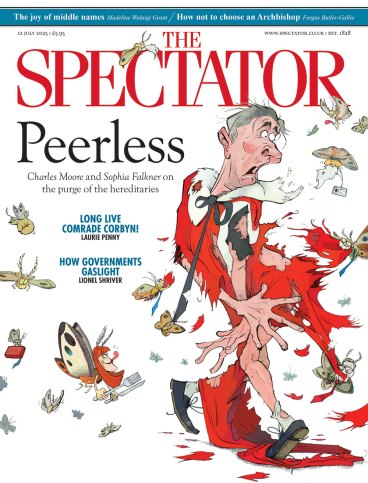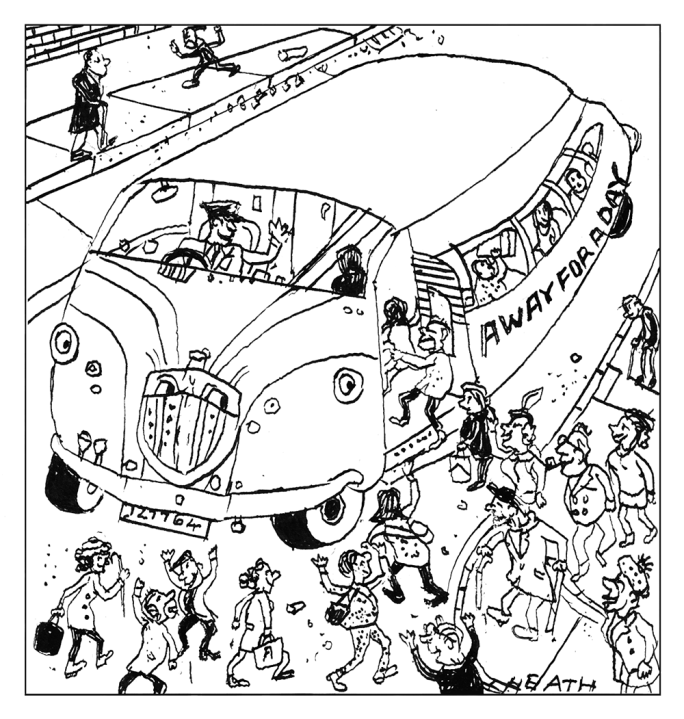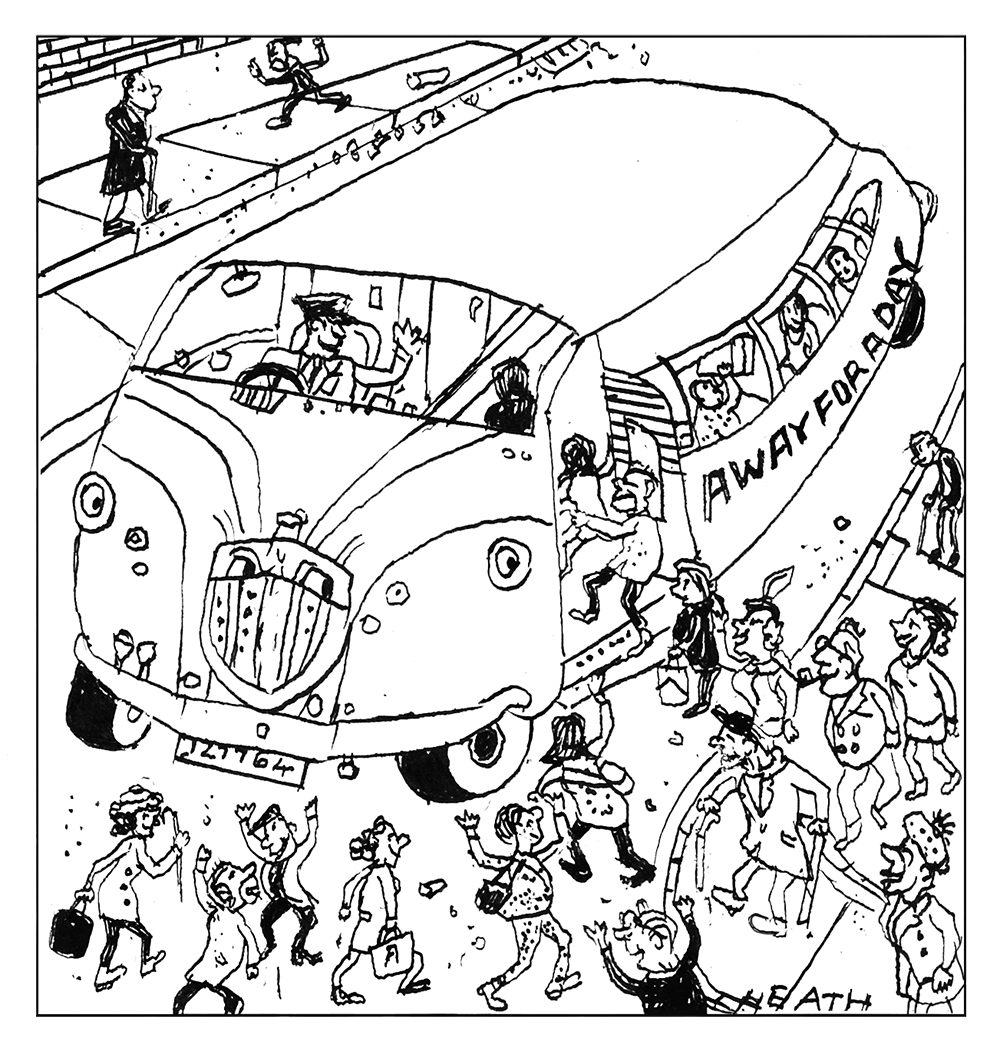
Early on Monday mornings, in service stations across the country, armies of the elderly are mustering. These are the OAPs about to embark on motor coach tours to the Norfolk Broads, Cornish fishing villages, the Yorkshire Moors and Welsh ghost towns, organised by men in blazers consulting clipboards, like Kenneth Williams in Carry On Abroad. There will be cream teas, along with river cruises, coastal excursions, scenic drives and jaunts on steam railways.
I am a devotee of these charming holidays, as invented by Wallace Arnold, even though when one first catches sight of one’s fellow travellers it’s a frightening vision of what’s up ahead: the sticks, walking-frames, mobility scooters, electric wheelchairs; the bald heads splotched with melanomas; the chemotherapy wigs with alopecia. No one possesses their own hips. Each is older than their teeth. Everyone is deaf, e.g. ‘Where have you come from?’ ‘Uxbridge.’ ‘Auschwitz?’
As the old folk have plenty of time on their hands, much of the first day on my most recent trip was spent heading in the wrong direction – as was the last day, when the zig-zagging put me in mind of an Atlantic convoy avoiding Nazi submarines by going to Lisbon by way of Brazil and Morocco. The old folk would find this nostalgic, like the Vera Lynn songs playing over the bus’s Tannoy.
I live in Hastings and my destination was Great Yarmouth, so the coach went first to Eastbourne, Lewes and Brighton before stopping at Cobham and, creeping along the M25 and finally the M11, out towards Cambridge and Norwich. It took 11 hours.
One woman had been picked up at dawn in Ruislip and three hours later, after collecting the rest of the passengers, the coach was driving past signposts to Ruislip. She laughed, but it was all rather disorientating, and an intimation of dementia – we had no idea quite where we were or where we were heading. Owing to deafness, instructions and mutterings from the driver are misheard in any event. It was fatal to ask the other passengers to repeat information, as this simply added another layer of error and confusion.
It was best simply to sit there, look out the window and allow events to unfold. I liked our shabbily elegant hotel, which was run by cheerful Asians. Dinner was at 6 p.m. The bar was open at 5.30. A bit early for me, but I adjusted. Brandon the young barman always had my bottle of filthy Chilean red in readiness, plus a bottle of Moldavian white in an ice bucket, plus double brandies for later on. It was a card-only bar, so my ‘contactless’ bill got to be vast. Most nights I was sound asleep by nine. I had only one fright. What I thought was the Elephant Man in the bedroom was me in my sleep apnoea mask reflected in the mirror.
Tuesday we were up early to visit Sandringham, far away on the other side of Norfolk. It’s very flat, isn’t it, Norfolk, and the local councils are doing their best to use up the cabbage patches and potato beds to meet the government’s exciting building quotas. Every other field is a new housing estate, or else billboards are up announcing the imminent construction of a new housing estate. Bulldozers are fast getting rid of any greenery.
No one possesses their own hips. Each is older than their teeth. Everyone is deaf
Sandringham is something of a film set, with no domestic mess or discarded newspapers, dog baskets or wellies – no sign of anyone inhabiting the place. As the King has access to heaps of houses and palaces, why not let this one out to immigrants and asylum seekers? For the house, surely superfluous, is vast, like a long street of higgledy-piggledy Edwardian villas. The gardens with mature trees, lakes and mazes are the highlight – and in the stable block is the actual car Princess Anne was in when she was nearly kidnapped in the Mall.
After a three-hour drive back to our hotel, I was looking forward to a bath – but as in the Soviet Union the plugs had been removed, ensuring showers only. This hot-water-saving policy was matched by a cold-water-saving policy in the restaurant. No jugs. You had to trek the entire length of the room to obtain a small glass.
Conversation and overheard remarks roundabout would have made Victoria Wood or Alan Bennett envious. ‘I went to Longleat and had a collapsed lung’ was a line I cherished. As was: ‘My son’s got cancer. All he wants is a bigger air fryer.’ One chap was very proud to tell everyone: ‘I’ve just had a foot-long hot dog.’
Though I perhaps should have gone on the optional excursion to Norwich and signed my books in Waterstones, instead I spent the free day in Great Yarmouth (where there are no bookshops), as I do love piers, model villages, provincial museums and collapsing Victorian seaside pavilions, of which sadly there were plenty.
In the evening there was what was described as ‘entertainment’ – a duff local singer who warbled wartime tunes and 1950s and 1960s classics, which he’d pre-recorded on some sort of amplifier. The audience was sparse. The old folks drifted away. But there was a cadre of perhaps half a dozen old ladies who remained, widows no doubt, who I thought were like what the St Trinian’s girls would have looked like 70 years on. After a few gins, their eyes still capable of glinting with naughtiness, they sang along – knowing the lyrics perfectly. In the half-light, their old age and the years melted slightly. Briefly, they were young again. Nobody asks to be old.








Comments